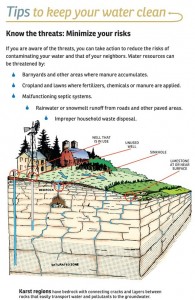Kewaunee Residents Challenging Wisconsin Water Quality Code
- Share
- Tweet
- Pin
- Share
Lynda Cochart hasn’t had a glass of her tap water in months. She doesn’t wash her vegetables in the water, doesn’t even brush her teeth with it, not since her well test showed unsafe levels of E. coli.
“Our water contamination has gotten worse,” she said. “I had four well tests done from early spring to early fall, and each one got worse.”
Kinnard Farms is near Cochart’s home, and she thinks the farm’s livestock waste is the source of her well contamination.
Cochart is one of five Lincoln Township residents petitioning the Wisconsin Department of Natural Resources (DNR), arguing the DNR didn’t do enough to protect public health when it issued a permit for Kinnard Farms to build a new waste storage facility.
Kinnard Farms is a Concentrated Animal Feeding Operation (CAFO). CAFOs are farms with more than 1,000 animal units, and their size requires the farmers to get more permits from the DNR.
Gretchen Wheat, DNR water resources engineer, expects to testify for the DNR during the contested case hearing of the Lincoln Township residents’ petition, scheduled for Feb. 11 in Green Bay. She said the DNR reviewed Kinnard Farms’ plans for expansion and granted the permit because those plans complied with the state’s rules and standards.
“Nitrate is a common groundwater contaminant in Wisconsin,” Wheat said. “There’s a lot of farming here, commercial fertilizer use as well as manure use, and there’s also individual septic systems. We don’t lack for potential causes of that contamination…You can have nitrate contamination from an individual septic system, sometimes people can end up contaminating their own wells. Sometimes it’s a neighbor.”
Cochart began upgrading her septic system this fall after her well water tested positive for contaminants. She hasn’t tested the water since, but plans to once the work is finished.
Attorney Sarah Williams of Midwest Environmental Advocates said the petitioners want more limitations and monitoring on the farm’s discharged water, and a limit on the number of animal units they can have with the permit.
“We want permits that have some real teeth and accountability, and really are enforceable,” Williams said. “There are a lot of narrative general conditions in these permits for CAFOs, and we want the DNR to be taking a more site-specific approach. Where there are going to be known surface water discharges, where there’s a risk of groundwater contamination, those things might warrant additional conditions and monitoring. We think they’re appropriate here and hope the DNR is able to put in the time and the manpower to make more enforceable and site-specific permits.”
The Lincoln Township residents’ petition is just one in the state where residents challenge CAFO operations. Others are over groundwater depletion and high-capacity wells.
“This cluster of cases involving approvals necessary for CAFO operations have been heating up in the past year, and I think that reflects the increasing size of the facilities and some citizen concern and frustration about these operations causing environmental pollution and degradation.”
For Cochart, petitioning a government agency is about protecting public health. She doesn’t think the DNR has enough funding or manpower to help protect the public, and hopes people take environmental health monitoring into their own hands.
“I think some of the people are afraid to find out, they’re afraid to find out their well is bad, that someone’s going to tell them they have to drill a new one,” Cochart said. “It’s just so unsafe for them to be drinking it and not knowing when our contamination here in this area is so bad. We’re just trying to get the word out on how important well testing is. It’s not that expensive when you compare it to your health.”
The hearing will be held on Feb. 11 at 10:30 am at Green Bay City Hall.



